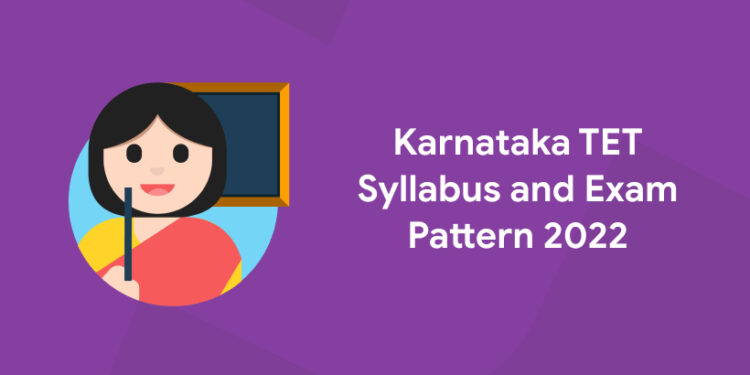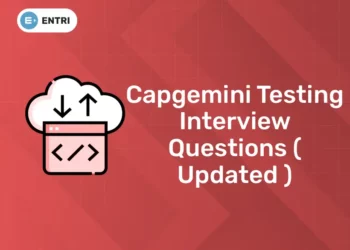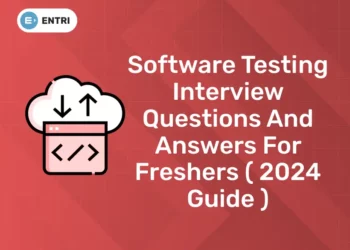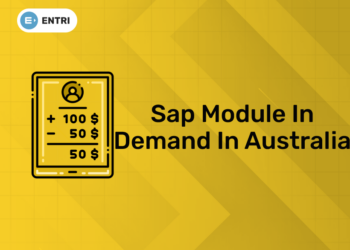Karnataka Teachers Eligibility Test is one of the most important examinations held in the state for the recruitment of eligible candidates for teaching roles in primary and upper primary schools across the state. The recruitment is conducted for the recruitment of eligible candidates to various posts under the Karnataka School Education Board (KSEB). Candidates who are interested in applying for this post can make the applications online from the official website once the notification is published. To score a good position in the rank list, it is very necessary that the candidates who are applying for the post have complete knowledge regarding the post, duties, Karnataka TET Syllabus 2022, Karnataka TET Exam pattern, and the kind of questions asked during the examination. The selection process followed by the commission in a recruitment examination is a very crucial part of exam preparation. Here are the details that the candidates have to know about Karnataka TET Syllabus 2022 and the Karnataka TET exam pattern and how to prepare accordingly for the examination.
Download Entri! Start your competitive exam preparation now!
Karnataka TET Exam 2022 Overview
|
Overview |
|
| Name of Examination | Karnataka Teacher Eligibility Test (KARTET) |
| Conducted By | Karnataka School Education Board (KSEB) |
| Post | Teacher for Classes 1 to 5 and 6 to 8 |
| Number of vacancies | Various |
| Official Website | schooleducation.kar.nic.in |
Karnataka TET examination is conducted in the state of Karnataka for the recruitment of candidates to teaching roles under the various government schools under the government. Here are some of the important details regarding the syllabus and examination pattern of Karnataka TET 2022.
Karnataka TET Exam Pattern 2022
Karnataka TET examination follows a certain pattern for the recruitment of teachers under various institutions. Here are the complete details regarding the examination pattern of the Karnataka TET examination.
- The candidates who are willing to teach the students of classes 1-5 will have to appear for the Paper-I of the Karnataka TET examination.
- Candidates who are willing to teach the students belonging to classes 6-8 will have to appear for the Paper-II of the Karnataka TET
Karnataka TET Exam Pattern for Paper 1
| Subject | Number of MCQs | Marks | Duration |
| Child Development and Pedagogy | 30 | 30 | 2 Hours 30 Minutes |
| Language I | 30 | 30 | |
| Language II | 30 | 30 | |
| Mathematics | 30 | 30 | |
| Environmental Studies | 30 | 30 | |
| Social Studies( For Visually Impaired candidates instead of mathematics and EVS) | 60 | 60 | |
| Total | 150 | 150 |
- Paper-I will be a written Objective type paper including 150 questions.
- The total marks will be 150 for the objective type paper.
- Each correct answer will be marked with a +1 mark.
Karnataka TET Exam Pattern 2022 for Paper 2
| Subject | Number of MCQs | Marks | Duration |
| Child Development and Pedagogy | 30 | 30 | 2 Hours 30 Minutes. |
| Language I | 30 | 30 | |
| Language II | 30 | 30 | |
| Mathematics and Science
(for Mathematics and Science teacher) OR Social Studies/Social Science (for Social Studies/Social Science teacher) |
60 | 60 | |
| Total | 150 | 150 |
- Paper-II will also be an objective type paper including 150 questions.
- The total marks will be 150 for Paper-II.
- Each correct answer will be marked with a +1 mark.
Karnataka TET Syllabus Syllabus 2022
Karnataka TET follows a specific examination structure and pattern. Since there are 2 papers for the examination and both these papers qualify for various qualifications to teach, here is the detailed syllabus for Paper 1 and Paper 2 of the Karnataka TET examination 2022.
Paper I (for classes I to V) Primary Stage
Child development and pedagogy
- Child development: Concept of development and its relationship with learning, Principles of the development of children, Influence of Heredity & Environment.
- Socialization processes: Social world & children (Teacher, Parents, Peers)
- Concepts of child-centered and progressive education: Piaget, Kohlberg and Vygotsky, constructs and critical perspectives., Critical perspective of the construct of Intelligence, Multi-Dimensional Intelligence, Language & Thought.
- Gender as a social construct: gender roles, gender – bias and educational practice, Individual differences among learners, understanding differences based on diversity of language, caste, gender, community, religion, etc.,
- The distinction between Assessment for learning and assessment of learning: School-Based Assessment, Continuous & Comprehensive Evaluation., perspective and practice, Formulating appropriate questions for assessing readiness levels of learners, for enhancing learning and critical thinking in the classroom, and for assessing learner achievement.
- Concept of Inclusive education and understanding children with special needs: Addressing learners from diverse backgrounds including disadvantaged and deprived Addressing the needs of children with learning difficulties, ‘impairment’ etc., addressing the Talented, Creative, Specially abled Learners
- Learning and Pedagogy: How children think and learn; how and why children ‘fail’ to achieve success in school performance.
- Basic processes of teaching and learning: children’s strategies of learning, learning as a social activity and social context of learning, Child as a problem solver and a ‘scientific investigator’.
- Alternative conceptions of learning in children: understanding children’s ‘errors’ as significant steps in the learning process. Cognition & Emotions, Motivation, and learning, Factors contributing to learning – personal & environmental
Language I
- Language Comprehension Reading unseen passages – Answering the question based on the given unseen passage. (Prose, Drama, or Poetry.)
- Pedagogy of Language Development: Learning and acquisition, Principles of Language Teaching, Role of listening and speaking, the function of language and how children use it as a tool. A critical perspective on the role of grammar in learning a language for communicating ideas verbally and in written form. Challenges of teaching language in a diverse classroom and Language Skills.
- Teaching-learning materials: Textbook, multi-media materials, multilingual resource of the classroom, Remedial Teaching
Language – II
- Language Comprehension Reading unseen passages – Answering the question based on the given unseen passage. (Prose, Drama, or Poetry.)
- Pedagogy of Language Development: Learning and acquisition, Principles of Language Teaching, Role of listening and speaking, the function of language and how children use it as a tool. A critical perspective on the role of grammar in learning a language for communicating ideas verbally and in written form. Challenges of teaching language in a diverse classroom and Language Skills.
- Teaching-learning materials: Textbook, multi-media materials, multilingual resource of the classroom, Remedial Teaching.
Mathematics Content
- Geometrical figures & the knowledge of space
- 3 – D Geometrical figures
- Numbers
- Fractions
- Mathematical operations on numbers and algebraic expressions
- Measurements – Weight, time, and volume
- Data handling & Measures of central tendency
- Ratio and proportion
- Mathematics in daily life
- Lines & angles
- Polygons
- Basic algebra – Linear equations & Identities
Pedagogical issues
Nature of Mathematics/Logical thinking; understanding children’s thinking and reasoning patterns and strategies of making meaning and learning, Place of Mathematics in Curriculum, Language of Mathematics, Community Mathematics, Evaluation through formal and informal methods, Problems of Teaching, Error analysis and related aspects of learning and teaching, Diagnostic and Remedial Teaching.
Environmental Science
- Our Environment: Major components of the environment, types of ecosystem, life diversity and its features, food chain, and nature balancing factors, Food web, ecological Pyramids, Plant and animal species, factors of Biodensity, Tropic levels, Types of pollution, reasons – effects – remedial measures, greenhouse effect, greenhouse gasses, sustainable development and its maintenance, waste management measures. Environment movements (Related to state and national level), Important Environment activists, state and national award-winning literature, and writers related to the environment, major environmental phenomena, types of ecological conservation.
- Living world: Life processes, classification of organisms. How do organisms reproduce? Cell, Tissues, Organs, and organs system.
- Sources of Energy: Solar Energy, Wind Energy, Tidal Energy, Geothermal Energy, Biodegradable wastes, non-biodegradable wastes, Chemicals in our daily life.
- Human Health and Hygiene: Carbohydrates: Types of Monomers, lipids, proteins, Vitamins, Minerals, Deficiencies.
- Natural Phenomena: Motion, Force, Gravitation, Newton’s laws of motion, distance – speed graphs.
- How do things work: Electricity: Definitions of important terminologies, SI units, Numerical.
Pedagogy of Environmental Science
- Important methods of teaching
- Current teaching-learning interaction.
- Main features of NCF – 2005
- Features and uses of practical methods.
- Values are to be integrated with the classroom learning process.
- Evaluation methods, existing evaluation methods, and maintenance of records.
Social Studies: (For Visually impaired instead of maths and EVS)
Concepts, content, and pedagogy of social studies pertaining to classes 6 to 8 and difficulty level up to secondary level (class 10).
Content
- History: When, Where and How, The Earliest Societies, The First Cities, Early States, New Ideas, The First Empire, Contacts with Distant lands, Political Developments, Culture and Science, New Kings and Kingdoms, Sultans of Delhi, Architecture, Creation of an Empire, Social Change, Regional Cultures, The Establishment of Company Power, Rural Life and Society, Colonialism and Tribal Societies, The Revolt of 1857 – 58, Women and reform, Challenging the Caste System, The Nationalist Movement, India After independence.
- Geography: Geography as a social study and as a science, Planet – Earth in the solar system, Globe, Environment in its totality: natural and human environment, Air, Water, Human-Environment – settlement, transport and communication, Resources – Types – Natural and Human, Agriculture.
- Social and Political Life: Diversity, Government, Local Government, Making a Living, Democracy, State Government, Understanding Media, Unpacking Gender, The Constitution, Parliamentary Government, The Judiciary, Social Justice and the Marginalized. Pedagogical issues: Concept & Nature of Social Science/Social Studies, Class Room Processes, activities, and discourse, Developing Critical thinking, Enquiry/Empirical Evidence, Problems of teaching Social Science/Social Studies, Sources – Primary & Secondary, Project Work, Evaluation.
Paper-II (for classes VI to VIII) Higher Primary
Child Development and Pedagogy
- Child development: Concept of development and its relationship with learning, Principles of the development of children, Influence of Heredity & Environment.
- Socialization processes: Social world & children (Teacher, Parents, Peers)
- Concepts of child-centered and progressive education: Piaget, Kohlberg and Vygotsky, constructs and critical perspectives., Critical perspective of the construct of Intelligence, Multi-Dimensional Intelligence, Language & Thought.
- Gender as a social construct: gender roles, gender – bias and educational practice, Individual differences among learners, understanding differences based on diversity of language, caste, gender, community, religion, etc.
- The distinction between Assessment for learning and assessment of learning: School-Based Assessment, Continuous & Comprehensive Evaluation., perspective and practice, Formulating appropriate questions for assessing readiness levels of learners, for enhancing learning and critical thinking in the classroom, and for assessing learner achievement.
- Concept of Inclusive education and understanding children with special needs addressing learners from diverse backgrounds including disadvantaged and deprived Addressing the needs of children with learning difficulties, ‘impairment’ etc., addressing the Talented, Creative, Specially abled Learners.
- Learning and Pedagogy: How children think and learn; how and why children ‘fail’ to achieve success in school performance. Basic processes of teaching and learning, children’s strategies of learning, learning as a social activity and social context of learning, Child as a problem solver and a ‘scientific investigator’. Alternative conceptions of learning in children, understanding children’s ‘errors’ as significant steps in the learning process. Cognition & Emotions, Motivation, and learning, Factors contributing to learning – personal & environmental
Language I
- Language Comprehension Reading unseen passages – Answering the question based on the given unseen passage. (Prose, Drama, or Poetry.)
- Pedagogy of Language Development: Learning and acquisition, Principles of Language Teaching, Role of listening and speaking, the function of language and how children use it as a tool. A critical perspective on the role of grammar in learning a language for communicating ideas verbally and in written form. Challenges of teaching language in a diverse classroom and Language Skills.
- Teaching-learning materials: Textbook, multi-media materials, multilingual resource of the classroom, Remedial Teaching
Language – II
- Comprehension: Two unseen prose passages (discursive or literary or narrative or scientific) with questions on comprehension, grammar, and Verbal Ability.
- Pedagogy of Language Development: Learning and acquisition, Principles of Language Teaching, Role of listening and speaking; function of language and how children use it as a tool, Critical perspective on the role of grammar in learning a language for communicating ideas verbally and in written form, Challenges of teaching language in a diverse classroom; language difficulties, errors and disorders, Challenges of teaching language in a diverse classroom; language difficulties, errors, and disorders, Evaluating language comprehension and proficiency: speaking, listening, reading and writing, Teaching – learning materials: Textbook, multimedia materials, multilingual resource of the classroom, Remedial Teaching.
Mathematics
Content :
- Arithmatic Progression
- Number system
- Statistics & Probability
- Trigonometry
- Coordinate geometry
- Identifies
- Pair of linear equations in two variables
- Quadratic equations
- Polynomials
- Mensuration
- Triangles
- Quadrilaterals
- Circles
- Area related to circles
Pedagogical issues: Nature of Mathematics/Logical thinking, Place of Mathematics in Curriculum, Language of Mathematics, Community Mathematics, Evaluation, Remedial Teaching, Problem of Teaching
Science
Physics
- Motion: Definitions, Types of motion, Law & Equations of motion.Laws and numerical.
- Gravitation: Law, numerical.
- How do things work :
- Light – Reflection- Refraction
- Lens – Concave, Convex
- Mirror – Concave, Convex – Images formed in Spherical mirrors and lens
- Electricity and Electric Circuits – Definitions, units, derivations.
- Resistors – Numericals, circuit diagrams.
- Magnetism – Definition, Various laws, numerical, AC, DC motors, and generators.
- Natural phenomenon: Eye, Eye defects. : TIR, Dispersion.
- Chemistry
- Materials & Materials in our daily life – Metals, non-metals. Physical and chemical properties
- Acids, Bases, and Salts: Physical and chemical properties.
- Atoms and Molecules: Formulae, Masses, electronic configuration.
- Polymers: Artificial, natural, uses.
- Natural resources: Types and applications.
- Chemicals in our daily life: Soaps, detergents, Sweeteners, medicines, Drugs.
- Biology
- Food – Definition of food, Food, and its importance, Food chain, Food web, Food pyramid
- Food and its sources – Plant source and animal source implications.
- Food and its constituents :
Energy giving food – Carbohydrates & lipids
Bodybuilding food – Proteins
Body protectors – Vitamins & minerals, Roughage, and water.
- Living World: Microorganisms, Plant kingdom, Animal kingdom
- Animal kingdom: Vertebrates, Invertebrates
- Cell: Plant cell and Animal cell – Tissues, organ, organ system.
Pedagogical issues: Nature & Structure of Sciences, Natural Science/Aims & objectives, Understanding & Appreciating Science, Approaches/Integrated Approach, Observation/Experiment/Discovery (Method of Science), Innovation, Text Material/Aids, Evaluation. – problems and remedial teaching.
Social Studies/Social Sciences
Content :
- History: When, Where and How, The Earliest Societies, The First Cities, Early States, New Ideas, The First Empire, Contacts with Distant lands, Political Developments, Culture and Science, New Kings and Kingdoms, Sultans of Delhi, Architecture, Creation of an Empire, Social Change, Regional Cultures, The Establishment of Company Power, Rural Life and Society, Colonialism and Tribal Societies, The Revolt of 1857 – 58 , Women and reform, Challenging the Caste System, The Nationalist Movement, India After independence.
- Geography: Geography as a social study and as a science, Planet – Earth in the solar system, Globe, Environment in its totality: natural and human environment, Air, Water, Human-Environment – settlement, transport and communication, Resources – Types – Natural and Human, Agriculture.
- Social and Political Life: Diversity, Government, Local Government, Making a Living, Democracy, State Government, Understanding Media, Unpacking Gender, The Constitution, Parliamentary Government, The Judiciary, Social Justice and the Marginalized.
Pedagogical issues: Concept & Nature of Social Science/Social Studies, Class Room Processes, activities, and discourse, Developing Critical thinking, Enquiry/Empirical Evidence, Problems of teaching Social Science/Social Studies, Sources – Primary & Secondary, Project Work, Current methods of Evaluation.
Click here to attempt KARTET Mock tests!
Candidates who wish to apply for the examination are requested to go through the complete syllabus and use the best materials for their preparation. Entri App provides you with the best preparation opportunities for your dream job. We provide a wide range of courses over different government exams. Sign Up for Entri classes and ace the preparation for the government job examinations and bank examinations today itself. Entri helps you with thousands of questions. Attempt mock tests, analyze yourself and improve your success rate. We wish you all the success in your preparations.













